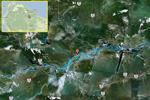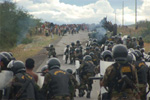An uncontacted tribe of about 60 people has been confirmed by FUNAI (Brazil’s Indigenous Affairs Department) in the Indigenous Territory of Arariboia, located in the eastern Amazonian state, Maranhao.
FUNAI believes that the uncontacted natives belong to the Awá tribe, one of Brazil’s last remaining nomadic hunter-gathering tribes. Although apart of a protected reserve, the Awa are threatened by intrusion on their lands.
“Their forest home is being rapidly destroyed by loggers and cattle ranchers, who hunt the game they rely on. Uncontacted Awá are highly vulnerable to attack and diseases transmitted by these outsiders, and there have been fatal conflicts in the past,” says indigenous rights organization Survival International in a news release, adding that, “this recent confirmation of another group of Awá reinforces the need for the authorities to monitor the area and protect it from invaders.”
It is thought that the Awá were at one time probably settled farmers, however invaders drove them off their land and into the nomadic lifestyle they have pursued for over a hundred years.
Intentional contact by the Brazilian government in the 1970s and 80s left many Awá dead from diseases like malaria and the flu. In the past, the Awá have been victims of violent attacks, sometimes massacres, by ranchers, loggers, miners, and settlers.
Related articles
Brazil establishes 20,000 sq mi of new indigenous reserves in the Amazon

(12/23/2009) On Monday, Brazil decreed nine new indigenous reserves covering 51,000 square kilometers (19,700 square miles) of the Amazon rainforest, an areas larger than Denmark or Switzerland, reports the AFP. Five of the reserves are located in the state of Amazonas, two are in Pará, one is in Roraima, and another is in Mato Grosso do Sul. The protected areas house about seven thousand Indians from 29 ethnic groups, according to FUNAI (Fundação Nacional do Índio), Brazil’s indigenous affairs agency.

(12/22/2009) In James Cameron’s newest film Avatar an alien tribe on a distant planet fights to save their forest home from human invaders bent on mining the planet. The mining company has brought in ex-marines for ‘security’ and will stop at nothing, not even genocide, to secure profits for its shareholders. While Cameron’s film takes place on a planet sporting six-legged rhinos and massive flying lizards, the struggle between corporations and indigenous people is hardly science fiction.
Cattle company bulldozing UNESCO site, threatening uncontacted natives

(12/09/2009) A Brazilian ranching company is bulldozing land within UNESCO Chaco Biosphere Reserve in Paraguay, home to the only uncontacted natives outside of the Amazon in South America. While the UNESCO status provides no legal protections to the area, it is meant as an international marker to protect the tribe of the Ayoreo-Totobiegosode and the forest they inhabit.
Brazilian tribe owns carbon rights to Amazon rainforest land

(12/09/2009) A rainforest tribe fighting to save their territory from loggers owns the carbon-trading rights to their land, according to a legal opinion released today by Baker & McKenzie, one of the world’s largest law firms. The opinion, which was commissioned by Forest Trends, a Washington, D.C.-based forest conservation group, could boost the efforts of indigenous groups seeking compensation for preserving forest on their lands, effectively paving the way for large-scale indigenous-led conservation of the Amazon rainforest. Indigenous people control more than a quarter of the Brazilian Amazon.
Google partners with Amazon tribe
(10/29/2009) The story of an indigenous Amazon tribe that has embraced technology in its fight to protect its homeland and culture is now highlighted as a layer in Google Earth.
Photos reveal illegal logging near uncontacted natives in Peru
(08/17/2009) Ariel photos show proof of illegal logging for mahogany occurring in a Peruvian reserve set aside for uncontacted natives. The photos, taken by Chris Fagan from Round River Conservation Studies, show logging camps set-up inside the Murunahua Reserve, meant to protect the uncontacted indigenous group, known as the Murunahua Indians, in the Peruvian Amazon.